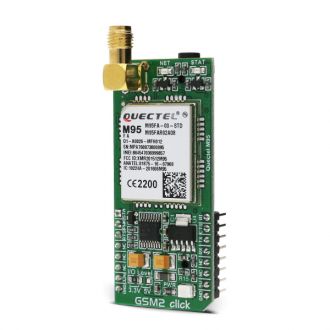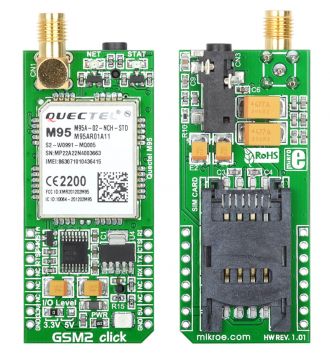
We strongly encourage users to use Package manager for sharing their code on Libstock website, because it boosts your efficiency and leaves the end user with no room for error. [more info]

Rating:
Author: MIKROE
Last Updated: 2018-03-13
Package Version: 2.0.0.1
mikroSDK Library: 1.0.0.0
Category: GSM/LTE
Downloaded: 22830 times
Followed by: 3 users
License: MIT license
GSM2 Click is a board in mikroBUSâ„¢ form factor which is a solution for adding GSM/GPRS communication layer to your device. It features Quectel M95 GSM/GPRS module which supports most GSM quad-band frequencies with 85.6 kbps GPRS data transfer.
Do you want to subscribe in order to receive notifications regarding "GSM 2 click" changes.
Do you want to unsubscribe in order to stop receiving notifications regarding "GSM 2 click" changes.
Do you want to report abuse regarding "GSM 2 click".


Library Description
The library carries a generic command parser adopted for AT command based modules. Generic parser.
Key functions:
gsm2_cmdSingle - Sends a provided command to the module.
gsm2_setHandler - Handler assignation to the provided command.
gsm2_modulePower - Turns on the module.
Examples Description
The example demo application waits for the cal, and after the call is received the parser will get hang up.
This code snippet shows how a generic parser should be properly initialized. Before the initialization, the module must be turned on, and in addition to this, the hardware flow control should also be turned on.
Commands:
void applicationInit()
{
// MODULE POWER ON
gsm2_hfcEnable( true );
gsm2_modulePower( true );
// MODULE INIT
gsm2_cmdSingle( "AT" );
gsm2_cmdSingle( "ATE0" );
gsm2_cmdSingle( "AT+IFC=2,2" );
gsm2_cmdSingle( "AT+CMGF=1" );
}
Along with the demo application, timer initialization functions are provided. Note that the timer is configured according to the default development system and MCUs, changing the system or MCU may require an update of timer init and timer ISR functions.
Other mikroE Libraries used in the example:
Additional notes and information
Depending on the development board you are using, you may need USB UART click, USB UART 2 click or RS232 click to connect to your PC, for development systems with no UART to USB interface available on the board. The terminal available in all MikroElektronika compilers, or any other terminal application of your choice, can be used to read the message.